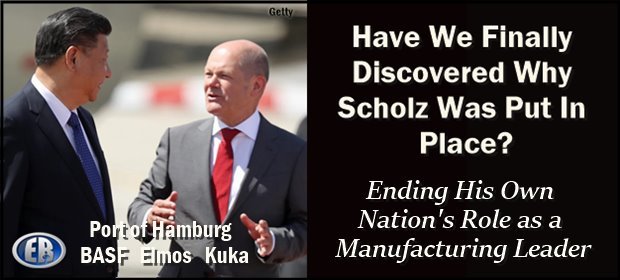
Beijing’s shares in port of Hamburg approved by Scholz
It is a geopolitically explosive decision: The German government has approved the acquisition of shares in a container terminal in the port of Hamburg by a Chinese state-owned company.
However, the Chinese participation is lower than originally intended. In the traffic-light government coalition, however, the decision is controversial – above all, the Greens and FDP also want a policy of confrontation with China and are critical of the entry of the Chinese.
According to the compromise that has now been found, the Chinese company Cosco will acquire a 24.9 percent stake in the container terminal in question. Acquisitions above this threshold were prohibited. Cosco originally wanted to acquire 35 percent. This prevents a strategic participation in the terminal and reduced the acquisition to a purely financial participation, argued the Ministry of Economic Affairs, worried about the danger to public order and security. Among other things, Cosco is prohibited from being granted contractual veto rights in strategic business or personnel decisions.
The Ministry of Economics under Robert Habeck had examined an agreement concluded in September 2021 between the Hamburg port logistics company HHLA and Cosco Shipping. Habeck wanted to completely ban Chinese entry in view of the experience with Russian gas supplies – as did other ministries, which also warned of risks for critical infrastructure. The chancellery, however, pushed for a compromise.
If the cabinet had not stepped in, the sale would have been automatically approved with a 35 percent stake – as originally agreed by Cosco and HHLA. To prevent this, a unified stance on the part of the government was necessary. In government circles there is talk of an “emergency solution”. Several departments have expressed serious concerns. Chancellor Olaf Scholz, on the other hand, is of the opinion that it is not a question of selling the port of Hamburg, but merely of acquiring a stake in a single terminal.
Greens and FDP follow US foreign policy
Scholz welcomed the compromise while the Greens and FDP wanted to stop Chinese participation in the port terminal altogether. Scholz does not share the security concerns about undue Chinese influence of his coalition partners and pointed out that the gigantic dimensions of the Port of Hamburg would not be affected by one terminal which is only a small part.
Calls for consequences are now being heard in the traffic-light coalition – with the aim of better protecting “critical infrastructure” from investors who are “not to be trusted” in future. Green parliamentary group leader Katharina Dröge called for a China policy that reduces strategic dependencies and does not cement them. FDP parliamentary group leader Christian Dürr said: “The Cosco case shows that the current legal situation no longer fits geopolitical reality.”
In fact, the entry of the Chinese in Hamburg is quite explosive. As part of the Silk Road project, China has long been studying Europe in order to invest in strategic infrastructure facilities. German coalition partners, on the other hand, are not all on board with the expansion of the Silk Road, which aims to increase the economic integration of the Eurasian region.
China also establishes chip foothold
Only days after the approval of the sale of a quarter of the Hamburg terminal Tollarort, which was forced by Scholz, comes the second deal: The sale of the Dortmund semiconductor manufacturer Elmos to the Chinese Sai Microelectronics was also approved. It was a second proposal that Scholz put forward during his congratulatory visit to Beijing.
It is officially said that the technologies of the car supplier Elmos are obsolete and the Chinese will continue to produce chips in Dortmund. But the Chinese are probably not interested in buying old technologies. They may shift most of their manufacturing to China soon with much lower labor, energy, bureaucracy, and taxes as in the case of the only former German robot builder Kuka in Augsburg.
The chancellor has maintained close relations with China for years and has had the Port of Hamburg in mind from the very beginning. Shortly after taking office as mayor, he flew to Shanghai in 2011 and negotiated with Chinese companies. In 2017, as a local politician, he even met China’s head of state Xi Jinping.
BASF leaves Germany
The German chemical company BASF, a symbol of Germany as an industrial location since 1865, will leave Europe for China.
CEO Martin Brudermüller himself announced the turning point to the public: BASF will shut down its European sites to a “permanently” low level due to a triple burden of sluggish growth, high energy costs and over-regulation. Instead, expansion in China is planned. “These challenging framework conditions in Europe are endangering the international competitiveness of European producers and are forcing us to adjust our cost structures as quickly and permanently as possible,” explained Brudermüller in his statement.
The long-established BASF group based in Ludwigshafen am Rhein has 238 production sites in 90 countries worldwide and employs over 110,000 people. A shift from Europe to China spells doom for Europe as an industrial and business location. For this year, BASF still expects sales of between 86 and 89 billion euros.
Experts have been warning for a long time about the development that has now been initiated, which is a direct consequence of the German energy and sanctions policy. BASF is just the beginning. But the decision of the world-famous leading group has a significant signal effect. The end of Germany as a business location has become a reality.
************
Source

••••
The Liberty Beacon Project is now expanding at a near exponential rate, and for this we are grateful and excited! But we must also be practical. For 7 years we have not asked for any donations, and have built this project with our own funds as we grew. We are now experiencing ever increasing growing pains due to the large number of websites and projects we represent. So we have just installed donation buttons on our websites and ask that you consider this when you visit them. Nothing is too small. We thank you for all your support and your considerations … (TLB)
••••
Comment Policy: As a privately owned web site, we reserve the right to remove comments that contain spam, advertising, vulgarity, threats of violence, racism, or personal/abusive attacks on other users. This also applies to trolling, the use of more than one alias, or just intentional mischief. Enforcement of this policy is at the discretion of this websites administrators. Repeat offenders may be blocked or permanently banned without prior warning.
••••
Disclaimer: TLB websites contain copyrighted material the use of which has not always been specifically authorized by the copyright owner. We are making such material available to our readers under the provisions of “fair use” in an effort to advance a better understanding of political, health, economic and social issues. The material on this site is distributed without profit to those who have expressed a prior interest in receiving it for research and educational purposes. If you wish to use copyrighted material for purposes other than “fair use” you must request permission from the copyright owner.
••••
Disclaimer: The information and opinions shared are for informational purposes only including, but not limited to, text, graphics, images and other material are not intended as medical advice or instruction. Nothing mentioned is intended to be a substitute for professional medical advice, diagnosis or treatment.





Leave a Reply